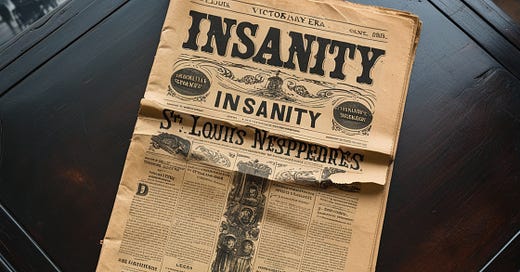I’m going to rewind just a little on this segment of the trial. Over the holiday break, I found more information about the beginning of Robert’s murder trial. I’m still clumsily climbing back into the saddle after the holidays, so I will briefly include this additional information about the prosecution’s case and will publish on Monday the beginning of the defense phase.
At 10 a.m. on March 7, 1876, the Boatright murder trial began. Robert P. Boatright’s defense plea was Insanity.
Newspaper references throw around 'familial insanity’ and ‘it ran in the family. I can’t say that wasn’t the case, but it isn’t something I’ve come across. Granted, this line diverges from my direct one back a few generations (Robert P.’s grandfather was brother to my 3x great-grandfather). I have researched that line as well, but haven’t found mention or evidence of insanity…yet. To be fair, conditions that could even be perceived as insanity were often closely guarded family secrets.
The defendant’s father, Robert M., doesn’t seem to have been afflicted with it, maybe a touch of shadiness here and there, but not insanity. (This ‘touch’ of shadiness will change later.) The newspapers cited Robert M. as “a well-known private detective.” One can suppose Robert’s defense attorneys felt insanity was the best approach, or maybe, the only approach to what had happened considering there was a courtroom full of eye witnesses.
Right off the bat, there was a kerfuffle regarding the defense not having been provided a list of the first forty jurors during voir dire. It wasn’t explained why this was brought up at the opening of the trial rather than before it started. The judge asked if the defense requested a list and the defense attorneys confirmed that they had. The defense received a list, but it didn’t jive with the pool of the first forty jurors from whom the complete jury was empaneled.
The defense requested they be able to present their objections to a couple of specific jurors, ostensibly already sworn in and observing the trial. Not at all awkward. This request seems to have been denied as no more mention of it was made. I don’t quite understand why this was brought up at the trial since generally, even then, both defense and prosecution attorneys are present during jury selection. Today, failing to provide the correct document would be considered a Brady violation, but it didn’t become law until 1963 (Brady v. Maryland, 373 U.S. 83 (1963)).
The morning session belonged to the prosecution. Attorney Normile proposed that Robert P. had a grudge against Charles Woodson even before Oscar Boatwright was killed, having previously been heard to threaten the boy’s life. Normile called for the murder weapon to be presented to the jury.
The first two witnesses were Judge Jones, who presiding over the trial during which Charles Woodson was killed, and Attorney Johnson who had been one of Charles Woodson’s defense attorneys. They retold what they had seen as they had done during the inquest.
Third was Charles’s sister Susan, previous identified as Susan Brown but now married to Malcolm, called as Susan Reed. She reiterated her story as she had given at her brother’s trial in 1875, describing how Charles was skating in front of their house. She clarified that the ‘skating’ Charles was doing was sliding back and forth on top of the ice that had formed across the sidewalk after a rain had turned to sleet. Robert, Oscar, and several other boys walked by. This was when Susan heard Robert threaten Charles.
Attorney Normile then called Dr. George Dudley who testified about the postmortem he performed on Charles. The doctor stated his findings and declared the cause of death to be peritonitis secondary to an abdominal stab wound.
After Dr. Dudley’s time on the stand, Attorney Normile rested the prosecution’s case. The judge adjourned court for the day and stated the defense would be opening their case the next morning.





